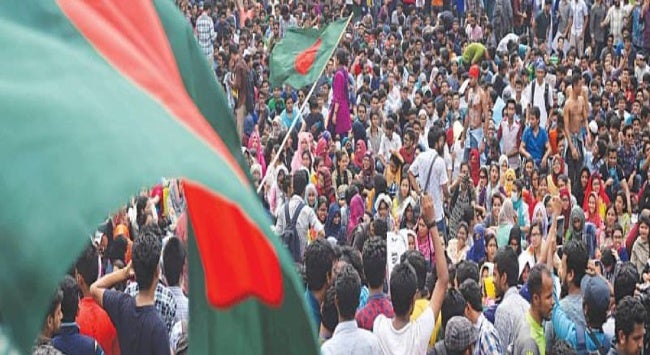Summary
With political tensions high and economic challenges looming, Bangladesh’s interim government faces mounting pressure to assert control. Its approach to governance, handling opposition, economic recovery and diplomatic relations will determine whether the country achieves lasting stability or remains mired in recurring unrest.
In the months following the student-led revolution that toppled Sheikh Hasina’s government in August 2024, Bangladesh’s transition remains fraught with challenges. The country is grappling with the consequences of ongoing political tensions. The complexities of this transitional period, marked by international scrutiny, diplomatic shifts and internal crackdowns, reveal the delicate balance between stability, justice and political realignment.
A fact-finding report by the United Nations(UN), released on 12 February 2025, has accused Hasina’s government of committing possible crimes against humanity in its bid to cling on to power last year. Covering the period from 1 July to 15 August 2024, the report highlights a systematic crackdown on protesters, with an estimated 1,400 people killed, most by security forces. The findings suggest that the government, supported by Awami League loyalists and security services, carried out a “widespread and systematic attack against protesters and other civilians.” Disturbingly, 12 to 13 per cent of those killed were minors. The report’s release intensifies pressure on the interim government to pursue accountability, as rights groups such as Odhikar demand justice for those who died in detention, allegedly due to torture or extrajudicial execution.
The interim government, led by Muhammad Yunus, has also responded to lingering pro-Hasina unrest with a sweeping crackdown dubbed ‘Operation Devil Hunt’. More than 1,300 people have been arrested nationwide, primarily Awami League members and their affiliates. Interior Ministry officials have framed the arrests as necessary to “uproot the devils” responsible for past abuses. However, this aggressive approach risks exacerbating tensions, particularly as Hasina, currently in exile in India, continues to rally her supporters. Her recent online speech, calling for resistance, led to widespread protests, including the destruction of her family home, and provoked diplomatic friction between Bangladesh and India.
Bangladesh’s interim government is simultaneously managing diplomatic challenges with India. Border tensions have escalated, with both nations blaming each other for rising violence along their shared boundary. A high-level Bangladesh Border Guard delegation arrived in New Delhi on 17 February 2025 for talks with the India’s Border Security Force, aiming to address issues such as trans-border crimes, insurgencies and border infrastructure. This marks the first formal meeting since Hasina’s ouster and reflects an effort to restore stability in bilateral relations.
Meanwhile, India’s External Affairs Minister S Jaishankar met with Bangladesh’s Foreign Affairs Advisor Touhid Hossain in Oman to discuss broader regional cooperation, including the Bay of Bengal Initiative for Multi-Sectoral Technical and Economic Cooperation initiatives. However, Hasina’s continued presence in India remains a contentious issue. Bangladesh’s foreign ministry has formally requested that India prevent her from making “fabricated” statements that incite unrest. India, in response, maintains that Hasina speaks in a personal capacity and has urged Bangladesh to avoid diplomatic escalations.
Amid political instability, Bangladesh is also facing energy supply challenges. The state-run Bangladesh Power Development Board has urged Adani Power to restore full electricity supply from its 1,600-megawatt plant in India. Power supply had been reduced due to payment disputes linked to Bangladesh’s foreign exchange crisis. The government has reportedly been paying US$85 million (S$113.4 million) monthly to clear its dues. This indicates an effort to stabilise energy availability.
Economically, Bangladesh faces a mixed outlook. The central bank projects gross domestic product growth of 4-5 per cent for the fiscal year 2024-25, lower than expected due to the political crisis, recent floods and inflationary pressures. However, officials anticipate a recovery in 2025-26 with the hopes that political uncertainty wanes. Government reports cite growing exports and declining inflation – down from 12 per cent to nine per cent – as signs of stability. Inflation is expected to fall further by July 2025, aided by monetary tightening and improved food supply chains ahead of Ramadan. With foreign reserves stabilising at around US$20 billion (S$26.6 billion), Bangladesh’s economic trajectory remains precarious but shows potential for recovery.
The coming months will be crucial in determining whether Bangladesh can emerge from its current instability and establish a new political and economic equilibrium. The interim government faces a key test: maintaining order without replicating the repressive tactics of its predecessor. Its sweeping crackdown on and suppression of Hasina loyalists under ‘Operation Devil Hunt’ suggests a tightening grip on power and raises concerns about political repression. At the same time, the UN report on human rights violations places pressure on the interim government to prosecute former officials or risk appearing complicit in impunity. Meanwhile, Hasina’s exile and continued influence present a delicate diplomatic situation with India. Mishandling these challenges could deepen divisions and prolong instability.
As Bangladesh seeks to reestablish international confidence, its approach to accountability, governance, diplomacy and reform will determine whether it can build a foundation for sustainable stability or remain trapped in cycles of unrest.
. . . . .
Dr Imran Ahmed is a Research Fellow at the Institute of South Asian Studies (ISAS), an autonomous research institute at the National University of Singapore (NUS). He can be contacted at iahmed@nus.edu.sg. The author bears full responsibility for the facts cited and opinions expressed in this paper.
Pic Credit: X
-
 More From :
More From :
-
 Tags :
Tags :
-
 Download PDF
Download PDF



